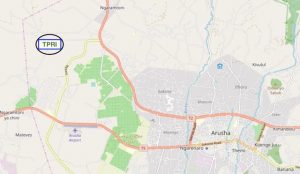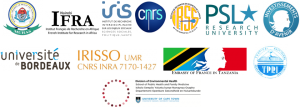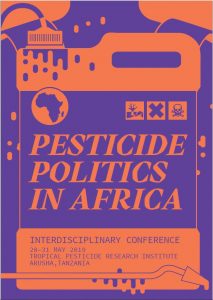PESTICIDE POLITICS IN AFRICA
INTERDISCIPLINARY CONFERENCE
–
28—31 MAY 2019
–
TROPICAL PESTICIDE RESEARCH INSTITUTE ARUSHA,TANZANIA

–
“Bilingual conference with simultaneous English <-> French translation
Conférence bilingue, avec traduction simultanée français <-> anglais
***
Free entrance, obligatory registration at: pesticidepolitics@gmail.com
Entrée libre, inscription obligatoire à: pesticidepolitics@gmail.com »
–
INTRODUCTION
L’essor économique en cours dans de nombreux pays subsaharien s’accompagne d’une augmentation sans précédent de pathologies non transmissibles (MNC) provoquées notamment par la pollution industrielle, dont les pesticides. Confrontés à des mobilisations locales et internationales appelant à un plus grand contrôle de l’utilisation des pesticides, les pouvoirs publics africains s’abstiennent bien souvent d’adopter et d’appliquer un cadre réglementaire strict — considéré comme potentiel obstacle au « développement ». Cette conférence interdisciplinaire vise à jeter les bases d’une coopération scientifique entre universitaires Africain.e.s et non Africain.e.s sur la gestion des risques sanitaires environnementaux et professionnels associés aux pesticides en Afrique. Elle souhaite étudier les arbitrages entre production et prévention qui sous-tendent l’expansion sur le continent d’une agriculture intensive en intrants chimiques, à comprendre les rapports entre technique, savoirs et pouvoir qui façonnent l’inscription des populations africaines dans l’économie mondialisée, et à saisir les inégalités sanitaires et environnementales qui en résultent.
–
The current economic boom in many sub-Saharan countries is accompanied by an unprecedented increase in noncommunicable diseases (NCDs) due to industrial pollution, including pesticides. While local and international mobilizations call for more stringent pesticide control measures, African governments often refrain from adopting and enforcing strict regulations – considered as potential obstacles to “development”. This interdisciplinary conference aims at laying the foundations for a long-term scientific cooperation between African and European scholars on the management of pesticide-related occupational and environmental health hazards in Africa. It aims at exploring the trade-offs between production and prevention that underlie the expansion of chemical-intensive agriculture on the continent, to understand the relations between technique, knowledge and power that condition the inclusion of African populations in the globalized economy, and to grasp the resulting health and environmental inequalities.
–
Programme Pesticide Politics in Africa
–
CfP_Conference Pesticide Politics_FINAL_compressed
CfP_Conference Pesticide Politics_VF_FINAL_lowres
–
PROGRAM
Tuesday 28 May 2019
9:00 am – 9:30 am: Arrivals
9:30 am – 10:15 am: Official opening (Guest of Honour)
10:15 am – 10:45 am: Welcome and general introduction
Moritz Hunsmann (IRIS, CNRS, France) & Nathalie Jas (IRISSO, INRA, France)
10:45 am – noon: Keynote 1: Pesticide-related health effects in Tanzania: the time to act
is now
Vera Ngowi (MUHAS, Tanzania)
noon – 1 pm LUNCH
1 pm – 3:30 pm Panel 1: Chronic and acute poisoning: the difficult objectivization of pesticide-related health problems (1)
Cancer and other chronic degenerative diseases following long term exposure to pesticides
Pierluigi Cocco, University of Cagliari, Italy
Pesticide self-harm in Africa – a project underway to understand the problem and ways to solve it on national, regional and global levels
Leah Utyasheva, University of Edinburgh, UK
Ayanthi Karunathne, University of Edinburgh, UK
Et al.
Collecting and using evidence of pesticide poisoning at the national and international levels
Sheila Willis, Pesticide Action Network UK, United Kingdom
Rina Guadagnini, Pesticide Action Network UK, United Kingdom
3:30 – 4 pm BREAK
4 pm – 5:30 pm Panel 1: Chronic and acute poisoning: the difficult objectivization of pesticide-related health problems (2)
Acute pesticide poisoning risks in Dano municipality, Burkina Faso
(Étude des risques d’intoxication aiguë aux pesticides dans la commune de Dano au Burkina Faso)
Sylvain Ilboudo, Institut de Recherche en Science de la Santé (IRSS/CNRST), Burkina Faso
Et. al.
Acute pesticide poisoning case registration in Uganda’s health care facilities: an experience from the Pesticides Use, Health and Environment Project
Daniel Sekabojja, Uganda National Association of Community and Occupational Health, Uganda
Et al.
Wednesday 29 May 2019
9 am – 11:30 am Panel 2: Pesticides as public problems or non-issues: material, social and political dimensions of their (in)visibility (1)
Global circulations and colonial legacies. The uneven consideration of the use of chlordecone in African banana plantations (Guinea, Cameroon, Côte d’Ivoire)
(Entre circulations globales et legs colonial. Les inégalités de l’usage du chlordécone dans des bananeraies africaines (Guinée, Cameroun, Côte d’Ivoire))
Malcom Ferdinand, IRISSO, CNRS, France
Unruly residues: the material politics of pesticide disposal
Angeliki Balayannis, University of Exeter, United Kingdom
Pesticide use and perceptions of health and well-being in western Kenya: agricultural practices, toxic exposure and risk
Miriam Waltz, Aarhus University (Denmark) and University of Oslo, Norway
11:30 am – 1 pm LUNCH
1 pm – 2.30 pm Panel 2: Pesticides as public problems or non-issues: material, social and political dimensions of their (in)visibility (2)
Chemical pollution, toxic exposures and environmental health in Tanzania
Signe Mikkelsen, University of Oslo, Norway
Transdisciplinary evidence gathering and collaborative intervention design in smallholder pesticide safety: A Ugandan Story
Philipp Staudacher, Swiss Federal Institute of Aquatic Science and Technology, Switzerland
Ruth Wiedemann, Swiss Federal Institute of Aquatic Science and Technology, Switzerland
Et al.
2:30 pm – 3 pm BREAK
3 pm – 5:30 pm Panel 3: Pesticide uses and their drivers (1)
Characterization of pesticides and practices of certain actors in the cotton zone around the biosphere of the Bala hippopotamus pond, Burkina Faso
(Caractérisation des pesticides et pratiques de certains acteurs en zone cotonnière autour de la biosphère de la mare aux hippopotames de Bala au Burkina Faso)
Bazoma Bayili, Institut de Recherche en Science de la Santé (IRSS/CNRST), Burkina Faso
Et al.
Pesticide use in households, sanitation and public health in the city of Dakar
(Pesticides utilisés dans les ménages, dans l’assainissement et en santé publique dans la ville de Dakar)
Ndeye Maïmouna Diene, Pesticide Action Network Africa, Senegal
Understanding the social logics of pesticide use in Bouaké (Côte d’Ivoire)
(Comprendre les logiques sociales des usages des pesticides à Bouaké, Côte d’Ivoire)
Dimi Théodore Doudou, Université Alassane Ouattara, Côte d’Ivoire
Et al.
Thursday 30 May 2019
9 am – 11.30 am Panel 3: Pesticide uses and their drivers (2)
Smallholder pesticide use, impacts and drivers in Uganda’s agro-political landscape
Ellinor Isgren, Lund University Centre for Sustainability Studies, Sweden
Elina Andersson, Lund University Centre for Sustainability Studies, Sweden
“Pesticides are our children now”: cultural and economic treadmills of agricultural technology adoption in Burkina Faso
Jessie Luna, Colorado State University, United States of America
Apples and pesticides: investigating development and commodities in the High Atlas Mountains
Zachary Goldberg, Penn State University, United States of America
11:30 am – 11:45 am BREAK
11:45 am – 1:00 pm Keynote 2: The role of personal protective equipment (PPE) in pesticide
registration: a critical approach
Alain Garrigou (Université de Bordeaux, France)
1 pm – 2 pm LUNCH
2 pm – 3:30 pm Panel 4: The politics of pesticide regulation and control (1)
A holistic view of pesticides controls, from the Kenyan smallholder’s perspective
James Krueger, Cornell University, United States of America
Kinuya Nkanata, Meru University of Science and Technology, Kenya
Cotton and pesticides: the role of regulatory institutions in rationalizing pesticide use
Joe Kabissa, Tanzania Cotton Board, Tanzania
Et al.
3:30 pm – 4 pm BREAK
4 pm – 5:30 pm Panel 4: The politics of pesticide regulation and control (2)
Pesticide policy in the context of pesticide regulation – a case study from Zanzibar
Nadja Stadlinger, Stockholm University, Sweden
Pesticide management and control in Burkina Faso: the state of play
(Contrôle de la gestion des pesticides au Burkina Faso : État des lieux)
Dieudonné Ouédraogo, Direction de Protection des Végétaux et du Conditionnement, Burkina Faso
Friday 31 May 2019
9 am – 10:15 am Keynote 3: Exploring crisis: what can scholarship on pesticides in Africa learn from social science research in Latin America?
Kees Jansen (Wageningen University, Netherlands)
10:15 am – 10:45 am BREAK
10:45 am – 12:15 pm Panel 5: Struggling with and without pesticides: strategies in facing agrochemicals and their detrimental effects (1)
Hierarchy of prevention measures to control occupational health risks related to pesticide use in agriculture. Which contribution of farm advisory services ?
(Hiérarchie des moyens de prévention destinés à contrôler les risques de santé au travail liés à l’usage des pesticides en agriculture. Quelle place pour le conseil agricole ?)
Catherine Laurent, INRA-SAD, France
The institutionalisation of organic farming in Benin: what role for agricultural extension work?
(Institutionnalisation de l’agriculture biologique au Bénin: Quel rôle pour le conseil agricole ?)
Olaïgbé Hounkpatin & Ismaïl Moumouni, Université de Parakou, Bénin
12:15 pm – 1:30 pm LUNCH
1:30 pm – 3 pm Panel 5: Struggling with and without pesticides: strategies in facing agrochemicals and their detrimental effects (2)
The institutionalisation of organic cotton in Benin and Uganda: project promoters facing conventional cotton sectors
(L’institutionnalisation du coton biologique au Bénin et en Ouganda : les promoteurs de projets face aux filières de coton conventionnel)
Pauline Bendjebbar, Université Paris-Est, France
“GMO and poison-free zones”: a citizen-based initiative to raise awareness and drive policy changes in pesticide management legislation in South Africa
Sasha Mentz, Independent Researcher, South Africa
3 pm – 3:30 pm Scientific conclusion
Eliana Lekei (TPRI, Tanzania)
3:30 pm – 4 pm Official closing (Guest of Honour)
CfP_Conference Pesticide Politics_FINAL_compressed
CfP_Conference Pesticide Politics_VF_FINAL_lowres

